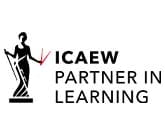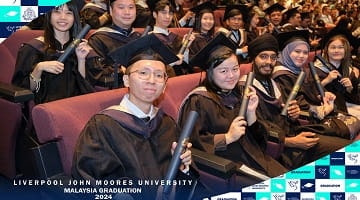2025/26 entry
BSc (Hons) Accounting and Finance with Foundation Year
- Start date:
- September
- Study mode:
- Full-time
- Course duration:
- 4 years FullTime, 5 years Placement year
- Campus:
- Mt Pleasant
- UCAS Code:
- N401
- Grades/points required:
- DDD - CDD (72 - 80)
Tuition fees
- Foundation first year
- £5,760
- International full-time per year
- £17,750
- Placement year
- £1,905
- Placement year international
- £3,830
- Second and subsequent years
- £9,535
- International admissions
- international@ljmu.ac.uk
Why study Accounting and Finance with Foundation Year at Liverpool John Moores University?
- Ranked 6th in the UK Guardian League Table 2025 - Subject Ranking Accounting & Finance
- 95% of students surveyed said academic support on this course was good or very good (National Student Survey 2024)
- Winner of 'Outstanding Course Team' at the JMSU Student Experience Awards 2023, voted for by LJMU students
- Professionally accredited by four of the main accountancy bodies in England and Wales
- Tutors trained at top accounting firms such as Deloitte, Ernst & Young and Grant Thornton
- Excellent business links with companies as diverse as Airbus, Matalan, Cummins, Volkswagen Group and NHS
- Options to work a year in industry or study abroad
- Opportunities to secure exemptions from UK professional accountancy qualifications once you graduate
- Shortlisted for the Times Higher Education Awards 2024 Business School of the Year
About your course
The BSc (Hons) Accounting and Finance at Liverpool John Moores University offers you the chance to secure professional accreditation from the four main accountancy bodies in England and Wales.
It also gives you a head start on the path to gaining a professional accountancy qualification, as it allows a number of exemptions from UK professional accountancy exams.
One of the benefits of the course is the option of taking a year out to complete a salaried placement in industry in the UK or overseas. However, if you prefer not to take a whole year out from your studies, you will have other opportunities for work-related learning.
Students on this programme also have the opportunity to spend one or two semesters in their second year on the identical LJMU degree programme at our partner college in Kuala Lumpur, Malaysia, keeping the professional body recognition of their studies at LJMU.
Liverpool Business School also has partnerships with business schools at universities and colleges across Europe, in the USA and in China. Students can choose to spend an additional year of study at one of our partner universities between the second and third years. All study abroad opportunities are in English. There are also many supported opportunities to study at partner universities during summer vacations and Liverpool Business School provides places on language skills courses.
Foundation Year
The Foundation Year is ideal if you have the interest and ability to study for a degree, but do not have the qualifications to enter directly onto the Accounting and Finance honours degree programme yet.
Once you pass the Foundation Year (level 3) you will progress directly onto the first year of the honours degree. If you are a full-time UK student, you will qualify for student financial support for the full duration of your course (subject to eligibility criteria).
-
Accounting Clinic at Liverpool Business School
The Accounting Clinic at LJMU’s Liverpool Business School is a pro-bono service offering registered UK charities (who fall under the £250,000 annual gross income threshold) their required annual in...
-
Moud's Story
Moud talks about her experience of studying Accounting & Finance degree and the opportunities and benefits of getting involved in the Accounting Clinic as part of her course.
...
"The degree has proved to be an excellent starting point for my career. I graduated with a solid grounding in the subject that was reflected in my remaining professional exams. My average marks at the professional stage were the highest in the region."
Professional accreditation/links
The BSc (Hons) Accounting and Finance is professionally accredited by four of the main accountancy bodies in England and Wales: the Institute of Chartered Accountants in England and Wales (ICAEW), the Chartered Institute of Management Accountants (CIMA), the Chartered Institute of Public Finance and Accountancy (CIPFA), and the Association of Chartered Certified Accountants (ACCA).
The number of exemptions you secure will depend on the professional route you decide to pursue (CIMA, ICAEW, CIPFA or ACCA) and the option modules you study in the final year of the programme.
Professional accreditation reflects LJMU's commitment to continually updating our syllabuses in line with professional requirements and will help ensure that you are given a head start to becoming a fully qualified accountant after graduation.
Graduates from the programme who can show their competence in the workplace are also eligible for full membership of the Association of Accounting Technicians (ATT). Competencies in the workplace can be obtained by completing the sandwich year or, alternatively, after you have graduated and spent a year in related employment.

Fees and funding
There are many ways to fund study for home and international students
Fees
The fees quoted above cover registration, tuition, supervision, assessment and examinations as well as:
- library membership with access to printed, multimedia and digital resources
- access to programme-appropriate software
- library and student IT support
- free on-campus wifi via eduroam
Additional costs
Although not all of the following are compulsory/relevant, you should keep in mind the costs of:
- accommodation and living expenditure
- books (should you wish to have your own copies)
- printing, photocopying and stationery
- PC/laptop (should you prefer to purchase your own for independent study and online learning activities)
- mobile phone/tablet (to access online services)
- field trips (travel and activity costs)
- placements (travel expenses and living costs)
- student visas (international students only)
- study abroad opportunities (travel costs, accommodation, visas and immunisations)
- academic conferences (travel costs)
- professional-body membership
- graduation (gown hire etc)
Funding
There are many ways to fund study for home and international students. From loans to International Scholarships and subject-specific funding, you'll find all of the information you need on our specialist funding pages.
Employability
A degree in Accounting and Finance opens up a huge range of potential careers because the success or failure of an organisation is ultimately determined by its financial performance.
Liverpool Business School has historically had an excellent employment record with graduates securing graduate-level positions with leading employers in public and private sectors. These include Everton Football Club, Kellogg company, Santander and Deloitte.
Most of our Accounting and Finance graduates complete three-year training contracts with professional accountancy firms or private/public sector organisations while studying part time for their remaining professional accountancy exams. Many contracts enable you to specialise in areas such as audit/assurance, tax, corporate finance, and business advice/consulting.
Outside accountancy, graduates have forged successful careers within retail and investment banks, financial services, finance companies, building societies and so on. However, if you do want to work in investment analysis and financial services, we advise you to qualify as a professional accountant first. This respected qualification gives you a solid platform from which to build your career, and once you qualify, there will be plenty of opportunities to move between different roles and industries in the UK and abroad. Recent graduates have found roles within organisations such as Lloyds TSB, Barclays, MBNA, The Bank of New York, Ulster Bank and WGZ Bank.
Student Futures - Careers, Employability and Enterprise Service
A wide range of opportunities and support is available to you, within and beyond your course, to ensure our students experience a transformation in their career trajectory. Every undergraduate curriculum includes Future Focus during Level 4, an e-learning resource and workshop designed to help you to develop your talents, passion and purpose.
Every student has access to Careers Zone 24/7, LJMU's suite of online Apps, resources and jobs board via the LJMU Student Futures website. There are opportunities for flexible, paid and part-time work through Unitemps, LJMU's in-house recruitment service, and we also offer fully funded Discovery Internships.
One-to-one careers and employability advice is available via our campus-based Careers Zones and we offer a year-round programme of events, including themed careers and employability workshops, employer events and recruitment fairs. Our Start-Up Hub can help you to grow your enterprise skills and to research, plan and start your own business or become a freelancer.
A suite of learning experiences, services and opportunities is available to final year students to help ensure you leave with a great onward plan. You can access LJMU's Careers, Employability and Start-up Services after you graduate and return for one-to-one support for life.
Go abroad
LJMU aims to make international opportunities available to every student. You may be able to study abroad as part of your degree at one of our 100+ partner universities across the world. You could also complete a work placement or apply for one of our prestigious worldwide internship programmes. If you wanted to go abroad for a shorter amount of time, you could attend one of our 1-4 week long summer schools.
Our Go Citizen Scheme can help with costs towards volunteering, individual projects or unpaid placements anywhere in the world. With all of these opportunities at your feet, why wouldn’t you take up the chance to go abroad?
Find out more about the opportunities we have available via our Instagram @ljmuglobalopps or email us at: goabroad@ljmu.ac.uk.
A life-changing experience
There's so much more to university than just studying for a degree.
-
Your future awaits
-
 Fees, funding and scholarships
Fees, funding and scholarships -
 University life
University life -
 Accommodation
Accommodation -
 Get involved
Get involved
News and views
Browse through the latest stories and updates from the University and beyond
What you will study on this degree
Please see guidance below on core and option modules for further information on what you will study.
Further guidance on modules
Modules are designated core or optional in accordance with professional body requirements, as applicable, and LJMU’s Academic Framework Regulations. Whilst you are required to study core modules, optional modules provide you with an element of choice. Their availability may vary and will be subject to meeting minimum student numbers.
Where changes to modules are necessary these will be communicated as appropriate.
Level 3
Core modules
Developing Skills for Business
20 credits
This module aims to facilitate your development of personal, academic and professional skills as a foundation for your current and future studies in Business related subjects. It will equip you with the tools to become confident and independent learners at university.
Introduction to Accounts Preparation and Financial Analysis
20 credits
The aim of the module is to introduce students to the main principles of double entry bookkeeping, basic accounts preparation and basic financial ratio analysis in preparation for further advanced study of financial accounting. Workshops and on-line activities will enable students to practice bookkeeping techniques and accounting ratios and demonstrate competency in these areas.
Introduction to Management Accounting
20 credits
The aim of the module is to introduce students to the foundations of management and cost accounting, and to provide them with the knowledge and skills needed to understand the role of cost and management accounting in an organisation, and how organisations use such information to aid organisation planning and decision making.
Introduction to Financial Numeracy
20 credits
To provide students with knowledge of the basic numeracy skills required for studies into accountancy and finance. The core purpose of this module is to provide students with the basic numeracy skills required to be successful at any study into accountancy and finance.
Data Analysis Techniques for Business
20 credits
This module equips you with the technical skills to be able to design and produce Microsoft Excel spreadsheets for business use, and to facilitate the development of basic analytical skills.
Accounting and Finance Case Study
20 credits
This module aims to facilitate the development of teamwork and analytical skills as a foundation for students current and future studies in related subjects. It will equip students with the tools to become confident and independent learners and presenters at university. The decision to deliver through workshops, tutorials and online teaching, is to enable the development of independent and deductive learning and the growth of self-efficacy.
Level 4
Core modules
Introduction to Financial Accounting
20 credits
This module has been designed to provide students with a sound foundation in bookkeeping, financial controls, accounting techniques and financial statements.
Business Mathematics & Statistics
20 credits
This module will enable students to appreciate the role of statistical and mathematical methods in a business environment. It will also introduce students to different data types and approaches required for analysis.
Introduction to Economics
20 credits
This module has been designed to provide students with an introduction to modern economic principles along with developing their understanding of micro and macro economics.
Academic & Professional Awareness
20 credits
This module will equip and prepare students for academic life at university. It will also explore professional skills necessary for future employment.
Introduction to Financial Reporting & Corporate Governance
20 credits
Building on module Introduction to Financial Accounting, this module develops knowledge and understanding of the regulatory framework of financial accounting, corporate governance and ethics.
Management & Cost Accounting
20 credits
The aim of this module is to develop an introductory knowledge and understanding of the nature and purpose of cost and management accounting information within the organisation.
Level 5
Core modules
Financial Accounting
20 credits
The aim of this module is to provide students with the knowledge and understanding to formulate and evaluate financial statements within the context of the existing regulatory framework and to demonstrate awareness of alternative methods of preparing financial statements.
Management Accounting for Decision Making
20 credits
The purpose of the module is to build on the basic management accounting methods used at Level 4 through coverage of a range of further techniques that aid costing, decision-making, planning and control.
Financial Management
20 credits
The aim of this module is to provide an understanding and contextualise key financial objectives of corporate, investment and international finance decision-making within the world's financial markets.
Data Analysis for Accounting and Finance
20 credits
This module has been designed to equip students with the technical skills to be able to accurately perform data modelling using appropriate software.
Developing Employability
20 credits
The aim of this module is to provide students with the practical skills necessary to secure undergraduate work experience placements/summer internships and/or graduate employment within the accounting or finance industry.
Law for Accounting and Finance
20 credits
The module provides an understanding of the legal nature of the limited company and of its constitution; the basic rules for the protection of potential investors; the company law requirements concerning corporate reports and accounts; directors and auditors; the concept of majority rule and minority protection and the corporate insolvency regimes.
Optional Modules
Sandwich Year - Accounting and Finance
120 credits
The aim is to provide students with an extended period of work experience at an approved partner that will complement their programme of study at LJMU. This will give students the opportunity to develop professional skills relevant to their programme of study as well as the attitude and behaviours necessary for employment in a diverse and changing environment. This extended placement forms a key part of a sandwich degree. All placements need to be assessed and approved prior to commencement in line with the LJMU Placement Learning Code of Practice. The Code of Practice requires students to conduct themselves in a professional and responsible manner during the placement - failure to do so may lead to the placement being terminated prematurely. Placements are normally for one calendar year on a full-time basis. Split placements of a shorter duration may be permissible. There is an expectation that a minimum of 1200 hours will be spent in the workplace.
Study Year Abroad - Accounting and Finance
120 credits
The aim is to provide students with an additional year of study at an approved overseas partner that will complement their programme at LJMU. This is an additional year of full-time study at an approved higher education institution. The modules to be studied must be agreed in advance, and must be appropriate for the student's programme of study. Assuming successful completion of this year, mark-bearing credit will be awarded by the Faculty Recognition Group. The grade conversion scale to be used will be made available in advance of the year abroad.
Level 6
Core modules
Advanced Financial Accounting
20 credits
This module covers both advanced accounting techniques and the critical evaluation of accounting theory. These two elements combine to give students a critical perspective on advanced techniques and the ability to suggest alternative approaches.
Strategic Management Accounting
20 credits
The purpose of this module is to provide an in-depth understanding of the role of management accounting in relation to the planning, control, decision-making and performance measurement activities of strategic management.
Corporate Finance
20 credits
Building on module Financial Management in Level 5 this module provides an in-depth analysis of a firms financing, liquidity management, distribution and risk management decisions.
Contemporary Issues in Accounting and Finance
20 credits
This module has been designed to expose students to some of the current issues in accounting and finance. It will enable students to critically explore these current themes enhancing their knowledge and understanding of the changing industry.
Optional Modules
Taxation
20 credits
The aim of this module is to give students a sound understanding of the UK tax system.
Auditing & Assurance
20 credits
This module has been designed to provide students with the knowledge and understanding of the audit process and its application in the context of the external regulatory framework and for business control purposes.
Personal Finance
20 credits
The aim of this module is to provide students with a rigorous framework within which to enable them to successfully work in the personal financial industry.
Financial Modelling and Valuation
20 credits
The purpose of this module is to provide an in-depth understanding of the development of the pitch book document used by investment banks when advising client organisations on capital raising, mergers and acquisition transactions.
Teaching and work-related learning
Excellent facilities and learning resources
We adopt an active blended learning approach, meaning you will experience a combination of face-to-face and online learning during your time at LJMU. This enables you to experience a rich and diverse learning experience and engage fully with your studies. Our approach ensures that you can easily access support from your personal tutor, either by meeting them on-campus or via a video call to suit your needs.
Teaching is delivered through a combination of lectures, workshops and seminars and you can expect to have a minimum of 12 hours contact time during each teaching week. Plus you'll be expected to complete independent study and group work and participate in online activities and discussions using our virtual learning environment, Canvas.
A skills module at level 4 (Academic & Professional Awareness) and at level 5 (Developing Employability) provide a mechanism through which the necessary personal development, placement and employment search and support activities are provided.
Work-related Learning
Early in level 5 you can decide whether to undertake a paid 48-week work placement in the UK or overseas. You would do this placement between level 5 and 6.
Placements give you experience of what its like to work in the finance sector as well as giving you a chance to put your learning into practice, develop personal skills and enhance your employability. Not only that, but the experience helps you develop personal skills, enhances your CV and gives you a years break from academic study.
Liverpool Business School's Placement Support Unit will help you find suitable vacancies and support you during the application process and whilst on placement.
Previous Accounting and Finance students have completed placements with organisations as diverse as the NHS, Disney and Unilever. You will have the option of taking a year out to complete a paid 48-week placement in industry in the UK or overseas.
Support and guidance
Dedicated personal tutor, plus study skills support
The Liverpool Business School is a supportive environment in which to study and the 'student-centred approach' of your tutors will ensure that you are given the support and guidance you need.
When you start you studies, you will be assigned a personal tutor. They will set up one-to-one tutorials with you to discuss a piece of coursework or to work with you on your personal development plan.
Assessment
Assessment varies depending on the modules you choose, but will usually include a combination of exams and coursework.
Assignments are designed to help you put financial theory into practice and demonstrate to future employers that you have the practical skills required to work successfully in your chosen field after graduation.
Your marks and feedback will be available within 15 working days of submitting a piece of work. Thats because we believe that constructive feedback is vital in helping you identify your strengths as well as the areas where you may need to develop further.
Course tutors
Our staff are committed to the highest standards of teaching and learning
Michael Franco
Programme Leader
Mike Franco is an experienced academic and Programme Leader responsible for Accounting and Finance programmes at Liverpool John Moores University.Mike has been Programme Leader at Liverpool John Moores University since 2010. His recent publications are concerned with topics such as studentification, the future of cities, and diversification.
As Programme Leader for Accounting and Finance he takes an active role in teaching and his principle research interests are in the field of quality assurance and enhancement within higher education.
Facilities
What you can expect from your School
The School is based in the Redmonds Building, in the heart of the bustling Mount Pleasant Campus and Liverpool 's growing Knowledge Quarter. The building is home to high quality lecture theatres and seminar rooms, social spaces, a cafe and a roof terrace with far reaching views of the cityscape and welsh hills. It is only a short walk from LJMU 's Aldham Robarts Library, which contains all the resources you will require for your studies, and is open seven days a week.
Entry requirements
Please choose your qualifications below to view requirements
Grades/points required from qualifications: DDD - CDD (72 - 80)
Qualification requirements
GCSEs and equivalents
Prior to starting the programme applicants must have obtained Grade C or Grade 4 or above in English Language and Mathematics GCSE or an approved alternative qualification below:
- Key Skills Level 2 in English/ Maths
- NVQ Level 2 Functional skills in Maths and English Writing and or Reading
- Skills for Life Level 2 in Numeracy/English
- Higher Diploma in Maths/ English
- Functional Skills Level 2 in Maths/ English
- Northern Ireland Essential Skills Level 2 in Communication or Application of Number
- Wales Essential Skills Level 2 in Communication or Application of Number
A levels
- Minimum number of A Levels required: 2
- Is general studies acceptable? Yes
- Average A Level offer: DDD
- Are AS level awards acceptable? Acceptable only when combined with other qualifications
- Maximum AS Level points accepted: 20
BTECs
- National Certificate (RQF): Acceptable only when combined with other qualifications
- National Extended Certificate: Acceptable on its own and combined with other qualifications
- National Diploma (RQF): Acceptable on its own and combined with other qualifications
- National Diploma subjects / grades required: DM if studied on its own or to the total of 72 UCAS points if combined with other qualifications
- National Extended Diploma (RQF): Acceptable on its own and combined with other qualifications
- National Extended Diploma subjects / grades required: MMP if studied on its own or to the total of 72 UCAS points if combined with other qualifications
Access awards
- Access to Higher Education Diploma acceptability: Acceptable on its own and combined with other qualifications
- Further information: At least 24 Merits and 21 Passes, or any other combination that equates to 72 UCAS Tariff points in a relevant subject
International Baccalaureate
- International Baccalaureate: Acceptable on its own and combined with other qualifications
- Additional information: 24 IB Diploma Points
Irish awards
- Irish Leaving Certificate: Acceptable on its own and combined with other qualifications
- Grades / subjects required: 72 UCAS Tariff points with a maximum 20 UCAS Tariff points from Ordinary Level
Welsh awards
- Welsh Baccalaureate: Acceptable only when combined with other qualifications
T levels
- T Level requirements: 72 UCAS points in a related subject
Alternative qualifications considered
Applicants with Accountancy qualifications will be considered as follows:
Association of Accounting Technicians (AAT): Holders of AAT NVQ/SVQ Level 3 Intermediate/ 'Advanced Certificate in Accounting' will be eligible for entry to Level 4 of the programme.
Holders of AAT NVQ/SVQ Level 4 Technician/'Diploma in Accounting' will be considered for 40 RPL credits against relevant Level 4 Accounting modules on the BSc (Hons) Accounting & Finance programme.
Chartered Institute of Management Accountants (CIMA): Holders of the CIMA Advanced Diploma (Managerial level complete; comprising 11 of the 15 CIMA professional exam papers (as of 2010-2011)) will be considered for direct entry to level 6 of the programme.
Association of Chartered Certified Accountants (ACCA):Applicants who have successfully completed the 'Skills' level (comprising 9 of the total of 14 ACCA professional exam papers (as of 2008-9)) will be considered for direct entry to level 6 of the programme. Applications are welcomed from mature and non-standard applicants, who will be considered on an individual basis. These applicants may be required to submit an essay and/or attend an interview, and should demonstrate potential and motivation and/or have relevant experience.
International applications will be considered in line with UK qualifications.
Additional requirements
-
Interview required
Mature and non-standard applicants may be invited to attend interview
International requirements
-
IELTS
6.0 (minimum of 5.5 in each component) or equivalent English language proficiency test.
Further information
-
DBS, Occupational Health requirements
Is a DBS check required?
No
-
Reduced offer scheme
As part of LJMU’s commitment to widening access we offer eligible students entry to their chosen course at a reduced threshold of up to 16/8 UCAS points. This applies if you are a student who has been in local authority care or if you have participated in one of LJMU’s sustained outreach initiatives, e.g. Summer University. Please contact the admission office for further details.
Please Note: All international qualifications are subject to a qualification equivalency check.
Application and selection
Securing your place at LJMU
UCAS is the official application route for our full-time undergraduate courses. Further information on the UCAS application process can be found here https://www.ljmu.ac.uk/study/undergraduate-students/how-to-apply.
We are looking for students with the potential to understand and critically evaluate the theory, concepts and principles that underpin the practical techniques of business. Demonstrate their understanding by communicating effectively, both orally and in their written work. Possess the self-discipline to manage their time and tasks effectively throughout their time here at LJMU to make a difference.
The university reserves the right to withdraw or make alterations to a course and facilities if necessary; this may be because such changes are deemed to be beneficial to students, are minor in nature and unlikely to impact negatively upon students or become necessary due to circumstances beyond the control of the university. Where this does happen, the university operates a policy of consultation, advice and support to all enrolled students affected by the proposed change to their course or module.
Further information on the terms and conditions of any offer made, our admissions policy and the complaints and appeals process.
-
BSc (Hons) Accounting and Finance
Full time
Find out more about studying for a BSc (Hons) degree in Accounting and Finance at Liverpool John Moores University. Apply now to take the next steps towards your future.
-
BSc (Hons) Applied Entrepreneurship
Full time
Find out more about studying for a BSc (Hons) degree in Applied Entrepreneurship at LJMU. Apply now to take the next steps towards your future.
-
BSc (Hons) Applied Management (Policing) | Degree Apprenticeship
Full time
Develop the knowledge, skills and behaviours needed to manage better in a policing and law enforcement environment.
-
BSc (Hons) Business Management
Full time
Find out more about studying for a BSc (Hons) degree in Business Management at LJMU. Apply now to take the next steps towards your future.
-
BSc (Hons) Business Management with Foundation Year
Full time
Find out more about studying for a BSc (Hons) degree in Business Management with Foundation Year at LJMU. Apply now to take the next steps towards your future.
-
BSc (Hons) Business with Digital Marketing
Full time
Find out more about studying for a BSc (Hons) degree in Business with Digital Marketing at LJMU. Apply now to take the next steps towards your future.
-
BSc (Hons) Business with Digital Marketing with Foundation Year
Full time
Find out more about studying for a BSc (Hons) degree in Business with Digital Marketing at LJMU. Apply now to take the next steps towards your future.
-
BSc (Hons) Business with Finance
Full time
Find out more about studying for a BSc (Hons) degree in Business with Finance at LJMU. Apply now to take the next steps towards your future.
-
BSc (Hons) Business with Finance with Foundation Year
Full time
Find out more about studying for a BA (Hons) degree in Business with Finance at LJMU. Apply now to take the next steps towards your future.








